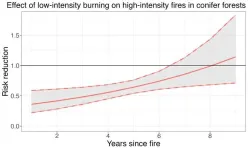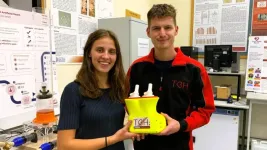(Press-News.org) Minneapolis, Minn. – In a recently released study, researchers at Hennepin Healthcare and other Minnesota health systems describe how a COVID-19 collaboration across Minnesota health systems was adapted to monitor near-real-time trends in substance use–related hospital and emergency department (ED) visits.
The Minnesota Electronic Health Record Consortium (MNEHRC), developed in response to the COVID-19 pandemic, repurposed its surveillance methods to identify health disparities and inform equity-driven approaches to the overdose epidemic.
MNEHRC’s study, "Minnesota Data Sharing May Be Model for Near-Real-Time Tracking of Drug Overdose Hospital and ED Trends," was published in the November issue of Health Affairs, the leading health policy journal in the United States. Using data from all six adult hospitals and EDs in Hennepin County, Minnesota, researchers found large increases in methamphetamine- and opioid-involved hospital and ED visits. Throughout the study period, Native American, Black, and multiple-race people experienced the highest rates of drug-involved hospital and ED visits.
“This study sets the framework for the data needed to reduce overdose deaths in Hennepin County,” explains Dr. Tyler Winkelman, who led the project and is past-president of the MNEHRC. “We spent a great deal of time building the infrastructure of the Consortium to address and inform the impact of COVID-19. We repurposed the collaboration and tools we developed to learn more about substance use trends in near real-time to inform interventions and, ultimately, save lives.”
The use of EHR data allows for detailed monitoring of the impact of the drug overdose epidemic across racial and ethnic groups. Additionally, monitoring drug-involved health care use through EHR data has the potential to help public health officials identify trends in near real time before deaths increase and may also inform early intervention and policy decisions.
Learn more
“Minnesota Data Sharing May Be Model for Near-Real-Time Tracking of Drug Overdose Hospital and ED Trends” article, HealthAffairs: https://www.healthaffairs.org/doi/full/10.1377/hlthaff.2023.00281
Minnesota Electronic Health Record (MN EHR) Consortium
Hennepin County Substance Use Disorder dashboard
Minnesota Department of Health Drug Overdose dashboard
Media Contacts:
Susan O’Reilly, Hennepin Healthcare Research Institute, 612-849-3129, soreilly@hhrinstitute.org
Christine Hill, Hennepin Healthcare, 612-873-5719, Christine.Hill@hcmed.org
Allison Thrash, Hennepin County Public Health, 612-600-9782, Allison.Thrash@hennepin.us
END
Researchers adapt health system COVID-19 collaboration to track near-real-time trends in visits for substance use
Detailed, timely data will inform equity-driven approaches to the drug overdose epidemic
2023-11-10
ELSE PRESS RELEASES FROM THIS DATE:
RIT’s Carichino receives National Science Foundation LEAPS-MPS award
2023-11-10
Rochester Institute of Technology’s Lucia Carichino, assistant professor in the School of Mathematics and Statistics, has received a Launching Early-Career Academic Pathways in the Mathematical and Physical Sciences (LEAPS-MPS) award from the National Science Foundation (NSF).
The award funds Carichino’s research in computational modeling of the interaction between the eye and a contact lens. Specifically, Carichino is focusing on orthokeratology (ortho-k) lenses that help reduce myopic progression in kids and young adults. She aims to develop a mathematical model that will ...
A closer look at rebel T cells
2023-11-10
LA JOLLA, CA—Scientists at La Jolla Institute for Immunology (LJI) are investigating a talented type of T cell.
Most T cells only work in the person who made them. Your T cells fight threats by responding to molecular fragments that belong to a pathogen—but only when these molecules are bound with markers that come from your own tissues. Your influenza-fighting T cells can't help your neighbor, and vice versa.
"However, we all have T cells that do not obey these rules," says LJI Professor and President Emeritus Mitchell Kronenberg, Ph.D. "One of these cell types is mucosal-associated invariant ...
Low-intensity fires reduce wildfire risk by 60%, according to study by Columbia and Stanford researchers
2023-11-10
There is no longer any question of how to prevent high-intensity, often catastrophic, wildfires that have become increasingly frequent across the Western U.S., according to a new study by researchers at Stanford and Columbia universities. The analysis, published Nov. 10 in Science Advances, reveals that low-intensity burning, such as controlled or prescribed fires, managed wildfires, and tribal cultural burning, can dramatically reduce the risk of devastating fires for years at a time. The findings – some of the first to rigorously quantify the value of low-intensity fire – come while Congress is reassessing the U.S. Forest Service’s ...
Unlocking the secrets of spin with high-harmonic probes
2023-11-10
Deep within every piece of magnetic material, electrons dance to the invisible tune of quantum mechanics. Their spins, akin to tiny atomic tops, dictate the magnetic behavior of the material they inhabit. This microscopic ballet is the cornerstone of magnetic phenomena, and it's these spins that a team of JILA researchers—headed by JILA Fellows and University of Colorado Boulder professors Margaret Murnane and Henry Kapteyn—has learned to control with remarkable precision, potentially redefining the future of electronics and data storage.
In a new Science Advances ...
University of Minnesota Medical School researchers investigate cause of cardiomyopathy in coronary artery disease using cardiac MRI
2023-11-10
MINNEAPOLIS/ST. PAUL (11/10/2023) — Researchers from the University of Minnesota Medical School examining the cause of cardiomyopathy discovered one out of every six patients with coronary artery disease had non-ischemic or dual cardiomyopathy.
The findings of this study were published this week in the peer-reviewed journal Circulation, the flagship journal of the American Heart Association.
Cardiomyopathies are diseases of the heart muscle. Patients with coronary artery disease can have cardiomyopathy from heart muscle ...
Heart of Gold: Bath student team wins world Heart Hackathon competition
2023-11-10
Student engineers from the University of Bath are on top of the world after winning an international competition to design an artificial heart.
Team Bath Heart took top prize at the grand final of the first-ever Heart Hackathon, which was held in Texas at the end of October.
Six members of the team presented their device to global experts in artificial heart technologies, competing against teams from Australia, the United States, Sweden, New Zealand, Romania and Egypt.
The ‘total artificial heart’ ...
Cleveland Clinic research links sleep apnea to increased risk of atrial fibrillation
2023-11-10
New research from Cleveland Clinic has identified a link between sleep apnea and the development of atrial fibrillation, a common heart rhythm disorder.
Published in JAHA, the study of over 42,000 patients found that sleep-related hypoxia - or low oxygen levels during sleep - is associated with a higher risk of developing atrial fibrillation over time. The study found this risk persisted even after accounting for lung function, suggesting sleep-related hypoxia independently increases atrial fibrillation risk separate from any underlying lung disease.
Atrial fibrillation causes an irregular ...
New approach to pancreatic cancer treatment expands therapeutic possibilities, shows promise for increased survival
2023-11-10
Preclinical research published in the Journal for ImmunoTherapy of Cancer points to a promising new treatment option for people with pancreatic cancer. Researchers from VCU Massey Comprehensive Cancer Center and the VCU Institute of Molecular Medicine (VIMM) suggest that when used in a form that can be delivered directly into the tumor cell, polyinosine–polycytidylic acid (pIC) suppresses tumor growth, induces cancer cell death and enhances survival in animal models with the most common form of pancreatic cancer.
Researchers also concluded that when used alone ...
UTHealth Houston partners with Mexican organizations for $5 million NIH grant to improve implementation of cancer control interventions in Mexico and Latin America
2023-11-10
A five-year, $5 million grant has been awarded by the National Cancer Institute (NCI) to the UTHealth Houston Institute for Implementation Science to support research and training in implementation science, with a focus on improving cancer control efforts in Mexico and Latin America.
The grant brings together researchers from UTHealth Houston, the Mexican National Institute of Public Health (INSP), the Mexican National Cancer Institute (INCan), and the University of California San Francisco (UCSF).
The grant will fund a new center, LISTOS for Cancer Control – Leveraging Implementation ...
Yucatán’s underwater caves host diverse microbial communities
2023-11-10
Cave divers collected 78 water samples throughout the complex web of underwater caves
Researchers found the cave system’s microbiome is distinct from the nearby sea
Microbial communities vary between cave systems forming distinct “neighborhoods”
EVANSTON, Ill. — With help from an experienced underwater cave-diving team, Northwestern University researchers have constructed the most complete map to date of the microbial communities living in the submerged labyrinths beneath Mexico’s Yucatán Peninsula.
Although previous researchers have collected water and microbial samples from the ...
LAST 30 PRESS RELEASES:
Brain cells drive endurance gains after exercise
Same-day hospital discharge is safe in selected patients after TAVI
Why do people living at high altitudes have better glucose control? The answer was in plain sight
Red blood cells soak up sugar at high altitude, protecting against diabetes
A new electrolyte points to stronger, safer batteries
Environment: Atmospheric pollution directly linked to rocket re-entry
Targeted radiation therapy improves quality of life outcomes for patients with multiple brain metastases
Cardiovascular events in women with prior cervical high-grade squamous intraepithelial lesion
Transplantation and employment earnings in kidney transplant recipients
Brain organoids can be trained to solve a goal-directed task
Treatment can protect extremely premature babies from lung disease
Roberto Morandotti wins prestigious Max Born Award for pioneering research in quantum photonics
Scientists map brain's blood pressure control center
Acute coronary events registry provides insights into sex-specific differences
Bar-Ilan University and NVIDIA researchers improve AI’s ability to understand spatial instructions
New single-cell transcriptomic clock reveals intrinsic and systemic T cell aging in COVID-19 and HIV
Smaller fish and changing food webs – even where species numbers stay the same
Missed opportunity to protect pregnant women and newborns: Study shows low vaccination rates among expectant mothers in Norway against COVID-19 and influenza
Emotional memory region of aged brain is sensitive to processed foods
Neighborhood factors may lead to increased COPD-related emergency department visits, hospitalizations
Food insecurity impacts employees’ productivity
Prenatal infection increases risk of heavy drinking later in life
‘The munchies’ are real and could benefit those with no appetite
FAU researchers discover novel bacteria in Florida’s stranded pygmy sperm whales
DEGU debuts with better AI predictions and explanations
‘Giant superatoms’ unlock a new toolbox for quantum computers
Jeonbuk National University researchers explore metal oxide electrodes as a new frontier in electrochemical microplastic detection
Cannabis: What is the profile of adults at low risk of dependence?
Medical and materials innovations of two women engineers recognized by Sony and Nature
Blood test “clocks” predict when Alzheimer’s symptoms will start
[Press-News.org] Researchers adapt health system COVID-19 collaboration to track near-real-time trends in visits for substance useDetailed, timely data will inform equity-driven approaches to the drug overdose epidemic




